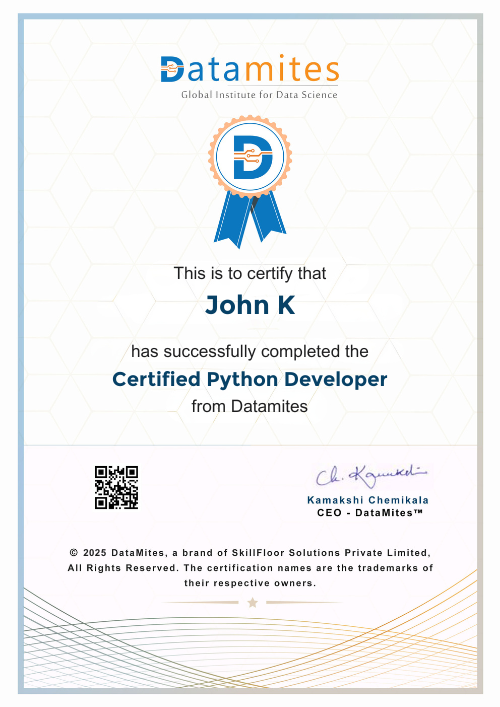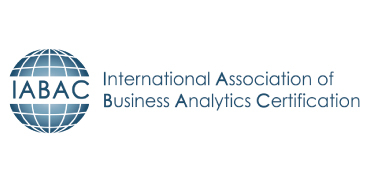Instructor Led Live Online
Self Learning + Live Mentoring
In - Person Classroom Training




• Introduction of python
• Installation of Python and IDE
• Python Variables
• Python basic data types
• Number & Booleans, strings
• Arithmetic Operators
• Comparison Operators
• Assignment Operators
• IF Conditional statement
• IF-ELSE
• NESTED IF
• Python Loops basics
• WHILE Statement
• FOR statements
• BREAK and CONTINUE statements
• Basic data structure in python
• Basics of List
• List: Object, methods
• Tuple: Object, methods
• Sets: Object, methods
• Dictionary: Object, methods
• Functions basics
• Function Parameter passing
• Lambda functions
• Map, reduce, filter functions
• Decorators
• Generators
• Context Managers
• Metaclasses
• Inheritance and Polymorphism
• Encapsulation and Abstraction
• Class methods and static methods
• Special (magic/dunder) methods
• Property decorators - getters, setters, and deletes
• Working with files
• Reading and writing files
• Buffered read and write
• Other file methods
• Logging & Debugger
• Modules and import statements
• SQL Basics
• Creating DB Table
• INSERT, READ, UPDATE, DELETE
• Introduction to MongoDB
• CRUD operations in MongoDB
• namedtuple(), deque, ChainMap,
• Counter, OrderedDict, defaultdict,
• UserDict, UserList, UserString
• Exceptions handling with try-except
• Custom exception handling
• List of general use exception
• Best practice exception handling
• Generators, Iterators
• The Functions any and all
• With Statement
• Data Compression
• A Daytime Server
• Clients and Servers
• The Client and Server Programs
• Classes and Threads
• Multi-threading; thread life cycle
• Regular Expression Syntax
• Group, Split and wildcards
• Quantifiers
• Match, Search and Find all methods
• Character Sequence
• Introduction to OpenCV, Installation
• Basic Operations on Images
• Image Filtering
• Image Classification
• Introduction to GIT
• Basic Git commands
• Introduction to Flask and Installation
• Creating project
• Routing,templates, forms and database integration
• Deployment on render
• Django Introduction and Installation
• Creating a Project
• Django Architecture and File Structure
• Folder Structure, First Django project
• Database and Views, Static Files and Forms
• URL Mapping and Routing
• Defining Models and Relationships
• Database Migrations and Schema Changes
• Querying Data using Django ORM
• Model Forms and Form Validation
• HTML Forms in Django
• Model Forms and Form Validation
• Formsets and Inline Formsets
• File Uploads and Validation
• Deploying Django Applications
• Hosting Options (e.g., Heroku, AWS)
• Project Showcasing and Review
Python is a high-level, interpreted programming language known for its simplicity and readability. It is widely used for various purposes such as web development, data analysis, machine learning, and automation.
The primary purposes of using Python are its versatility, ease of use, and wide range of libraries and frameworks available, making it suitable for tasks like web development, data analysis, scientific computing, and automation.
Some typical examples of Python applications include web development frameworks like Django and Flask, data analysis libraries like Pandas and NumPy, machine learning libraries like TensorFlow and PyTorch.
Skills necessary for Python programming include knowledge of basic programming concepts, syntax, data types, control structures, functions, and object-oriented programming. Familiarity with libraries and frameworks relevant to specific domains is also beneficial.
Commonly used tools in Python programming include integrated development environments (IDEs) like PyCharm and Visual Studio Code, code editors like Sublime Text and Atom, version control systems like Git, and package managers like pip.
Common job roles associated with Python programming include Python developer, web developer, data analyst, data scientist, machine learning engineer, and automation engineer.
Certified Python Developer courses vary in content and duration but typically cover Python programming concepts, syntax, data types, control structures, functions, modules, file handling, and libraries/frameworks relevant to web development, data analysis, and automation.
Python course costs in India typically vary based on factors like the institute and course level, with prices ranging from INR 40,000 to INR 80,000 on average.
Eligibility requirements for learning Python courses in Faridabad may vary based on the institute and course level. In general, there are no strict eligibility criteria, and anyone with a basic understanding of computer programming can learn Python.
The four main data types in Python are integers (int), floating-point numbers (float), strings (str), and Booleans (bool).
Python provides functionalities for tasks such as data manipulation, file handling, web scraping, web development, scientific computing, data analysis, machine learning, and automation.
The choice between Java and Python depends on the specific use case and requirements. Java is commonly used for large-scale enterprise applications, while Python excels in areas like data analysis, web development, and machine learning due to its simplicity and extensive library support.
Python is more suitable for Data Science due to its extensive libraries like Pandas, NumPy, and scikit-learn, which provide powerful tools for data manipulation, analysis, and modeling.
Advantages of using Python programming for machine learning include its simplicity, extensive libraries (e.g., Scikit-learn, TensorFlow, PyTorch), strong community support, availability of pre-trained models, and integration with other data processing and visualization tools.
Python is more suitable for Artificial Intelligence due to its versatility, wide range of libraries, and frameworks like TensorFlow and PyTorch, which enable the development and deployment of AI applications with ease.
Choosing DataMites Institute for Python Training in Faridabad offers the benefits of a comprehensive curriculum, experienced trainers, hands-on practical sessions, and industry-relevant projects, leading to enhanced Python skills and better job prospects.
Enrolling in Python Training provided by DataMites in Faridabad is recommended due to its trusted reputation, proven track record of successful students, and commitment to delivering high-quality training aligned with industry standards, ensuring valuable learning and career opportunities.
The duration of the course is four months, including 20 hours of live online training and 400 learning hours.
DataMites offers Python training courses in Faridabad with various pricing options. The live online training option is available for INR 36,000, blended mode learning is priced at INR 22,000, and on-demand classroom training can be availed for INR 36,000.
In Faridabad, DataMites provides a range of supplementary courses related to Python, including training for Certified Python Developers, Python for data science, Data Mining using Python, Machine Learning with Python, and Deep Learning with Python.
DataMites offers Python training that is open to students with diverse educational backgrounds, including graduates, postgraduates, and 12th graders. The training program is tailored for beginners, focusing on building a solid foundation in the fundamental principles of the Python language.
DataMites in Faridabad provides a dedicated Placement Assistance Team (PAT) that extends comprehensive support to graduates of the Python training course. The PAT assists students with job connections, resume building, conducting mock interviews, and interview preparation, ensuring they are fully prepared for successful job placements.
Learning Through Case Study Approach
Theory → Hands-on → Case Study → Project → Model Deployment
DataMites offers the Flexi-Pass option for Python training, granting individuals the flexibility to access training sessions for a duration of 3 months. This allows participants to conveniently address queries, engage in revision, and attend additional training sessions as needed, catering to their specific requirements.
Prospective participants of DataMites can take advantage of a complimentary demo class, which offers a preview of the training approach and course content. This opportunity enables individuals to gain insights into the training process and develop a clear understanding of what they can anticipate from the program.
DataMites provides the internationally recognized IABAC® certification for Python, validating proficiency in the language. Obtaining this certification serves as a testament to one's skills and knowledge in Python programming, offering global recognition of their expertise.
The different payment methods available for DataMites Python training in Faridabad are:
In Faridabad, DataMites offers Python courses utilizing a blended training approach that combines live online sessions and classroom training. This combination provides learners with flexibility and convenience, catering to different learning preferences and ensuring a comprehensive and well-rounded learning experience.
Yes, during the training session, candidates are expected to bring valid Photo ID proofs, such as a National ID card or Driving license, as a requirement.
The salary of a Python developer in India ranges from INR 7,55,320 per year according to an Indeed report.
The DataMites Placement Assistance Team(PAT) facilitates the aspirants in taking all the necessary steps in starting their career in Data Science. Some of the services provided by PAT are: -
The DataMites Placement Assistance Team(PAT) conducts sessions on career mentoring for the aspirants with a view of helping them realize the purpose they have to serve when they step into the corporate world. The students are guided by industry experts about the various possibilities in the Data Science career, this will help the aspirants to draw a clear picture of the career options available. Also, they will be made knowledgeable about the various obstacles they are likely to face as a fresher in the field, and how they can tackle.
No, PAT does not promise a job, but it helps the aspirants to build the required potential needed in landing a career. The aspirants can capitalize on the acquired skills, in the long run, to a successful career in Data Science.



